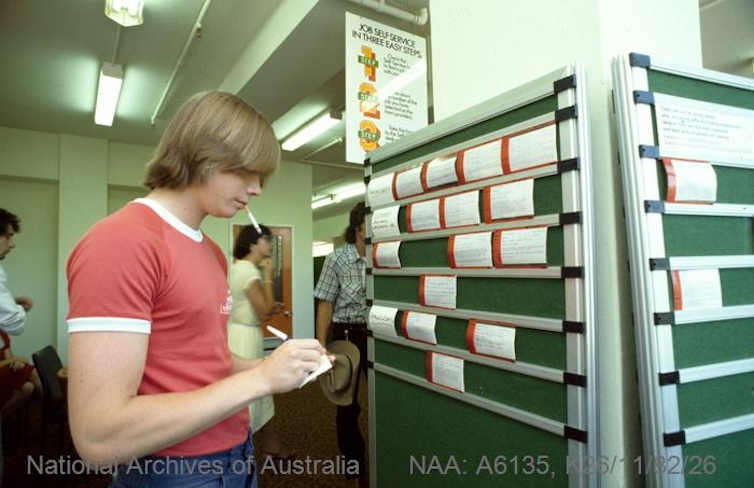
There’s talk of bringing back Australia’s Commonwealth Employment Service.
The Community and Public Sector Union has launched a campaign, the parliament has begun an inquiry into the appropriateness of the present system of outsourcing employment services, and the government’s employment white paper has been deeply critical of the system we have at the moment.
The Commonwealth Employment Service was itself the result of Australia’s first employment white paper in 1945, which wanted a service designed, in its words:
to bring to the notice of men and women seeking employment the full range of opportunities, and in particular to find employment offering scope for their abilities
to enable employers to draw upon suitable labour throughout the Commonwealth
to provide assistance where necessary to enable employees to move to where employment is available.
It staffed offices throughout the country in which workers wanting to be matched with jobs would thumb through index cards and seek advice from expert job matchers.

The service closed in 1998 when the Howard government decided to outsource it to private job providers who would be paid for performance.
It hasn’t worked as planned.
The September 2023 white paper says it is seen as “highly transactional and poorly tailored to the diverse and complex needs of people who use it”.
Services were thought to:
do little to support job seekers and build their capabilities, with one stakeholder arguing that national employment services had failed to keep those people at the highest risk of disadvantage connected with labour markets, let alone in paid employment.
A handful of corporations now dominate the system, raking in large profits while arguably failing in their obligations.
Treasurer Jim Chalmers has told The Conversation’s Michelle Grattan he wants to reform the system and he will be using the insights of the parliamentary committee.
But my PhD research into Australia’s employment services suggests putting things back to how they were would be a bad idea, for two reasons.
First, it would require commitment from the Commonwealth and resources that have been lacking for decades. The government used to be able to do more.
Bringing back the Commonwealth Employment Service would require placing a new Commonwealth agency office in every major town and centre across the country – akin to expecting someone who was emaciated to train for the Olympics.
These days the government is too incapacitated to manage even basic functions without support from expensive consultants, let alone to manage an expansion.
Its incapacity is evident every time there’s a national crisis. The only agency it can reliably call on is the defence force because there’s little else left.
Read more: Politics with Michelle Grattan: Treasurer Jim Chalmers on jobs and work
Back at the time of the 2009 Black Saturday bushfires, social workers and counsellors from Centrelink and the Commonwealth Rehabilitation Service were rapidly redeployed and played crucial roles.
The Commonwealth Rehabilitation Service was abolished in the Coalition’s first 2014 budget and the remaining social workers in Centrelink are overwhelmed.
The Commonwealth can now barely manage contracts
In the early stages of outsourcing, the Department of Employment still had staff with Commonwealth Employment Service experience and were able to manage the outsourcing contracts well – they understood how complicated labour markets were at the local level.
But these days it’s unlikely there’s anyone is left within the department with direct experience with the service, or even any kind of service.
Each of the previous reviews of employment services over the last 20 years (at least five by my count) has entertained the fantasy that a special blend of incentives can be created to get outsourced providers to do the right thing.
Not only has the Commonwealth’s capacity to deliver services dwindled, its ability also to effectively purchase services has diminished them as well.
The Commonwealth links programs to payments
The other reason not to reestablish a Commonwealth Employment Service is that these days the government links the provision of services to the payment of benefits, through what it calls “mutual obligations”.
Providers complain they’ve got to divert staff away from liaising with potential employers to managing compliance.
Oblivious to the irony, when I appeared before the parliamentary inquiry, federal politicians told me about the effectiveness of some local and state government initiatives, asking why they were successful.
They are successful because they focus on matching employers and employees rather than linking obligations to benefits.
State, territory and local governments around the country have long realised the Commonwealth is unable to properly focus on getting people jobs and have taken matters into their own hands, usually at a fraction of the cost.
States do things better

Unemployed workers are voting with their feet and turning to these locally run services, sometimes risking suspension of their Centrelink payments because they have failed to turn up to meetings with their official employment provider.
Imagine the possibilities if the Commonwealth were to hand over to the states and local government the northwards of $3 billion it blows each year on its often useless and sometimes harmful programs.
States and territories could then develop really superior services, like Switzerland, where employment services are developed and delivered at the level of individual cantons (states). It means what works in Geneva doesn’t have to be imposed on Zurich, producing better outcomes.
The Commonwealth will never be good at providing services while it is obsessed with controlling the welfare budget, and it is responsible for the welfare budget. The states don’t have that problem and do have an immediate on-the-ground interest in getting their citizens into jobs.
David O'Halloran is not a member but provides volunteer support to the Australian Unemployed Workers Union
This article was originally published on The Conversation. Read the original article.







